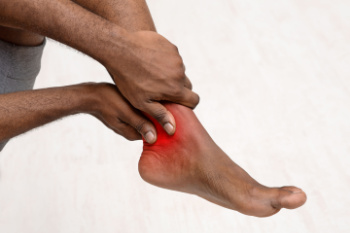
Ankle arthritis can significantly impact daily life, causing pain, stiffness, and swelling surrounding the ankle joint. Symptoms often worsen with activity and can limit mobility. Individuals may notice a reduced range of motion and find it difficult to walk or climb stairs without discomfort. Lifestyle modifications, such as maintaining a healthy weight and choosing appropriate footwear, can help manage symptoms. For more severe cases, surgical interventions like ankle fusion or ankle replacement may be help restore function and reduce pain. Podiatrists can provide a tailored treatment plan to manage symptoms effectively and enhance your overall mobility and comfort. If you are experiencing persistent ankle pain or suspect arthritis, it is suggested you schedule an appointment with a podiatrist.
Ankle pain can be caused by a number of problems and may be potentially serious. If you have ankle pain, consult with Richard Galperin, DPM from Texas. Our doctor will assess your condition and provide you with quality foot and ankle treatment.
Ankle pain is any condition that causes pain in the ankle. Due to the fact that the ankle consists of tendons, muscles, bones, and ligaments, ankle pain can come from a number of different conditions.
Causes
The most common causes of ankle pain include:
- Types of arthritis (rheumatoid, osteoarthritis, and gout)
- Ankle sprains
- Broken ankles
- Achilles tendonitis
- Achilles tendon rupture
- Stress fractures
- Bursitis
- Tarsal tunnel syndrome
- Plantar fasciitis
Symptoms
Symptoms of ankle injury vary based upon the condition. Pain may include general pain and discomfort, swelling, aching, redness, bruising, burning or stabbing sensations, and/or loss of sensation.
Diagnosis
Due to the wide variety of potential causes of ankle pain, podiatrists will utilize a number of different methods to properly diagnose ankle pain. This can include asking for personal and family medical histories and of any recent injuries. Further diagnosis may include sensation tests, a physical examination, and potentially x-rays or other imaging tests.
Treatment
Just as the range of causes varies widely, so do treatments. Some more common treatments are rest, ice packs, keeping pressure off the foot, orthotics and braces, medication for inflammation and pain, and surgery.
If you have any questions, please feel free to contact our office located in Dallas, TX . We offer the newest diagnostic and treatment technologies for all your foot care needs.
